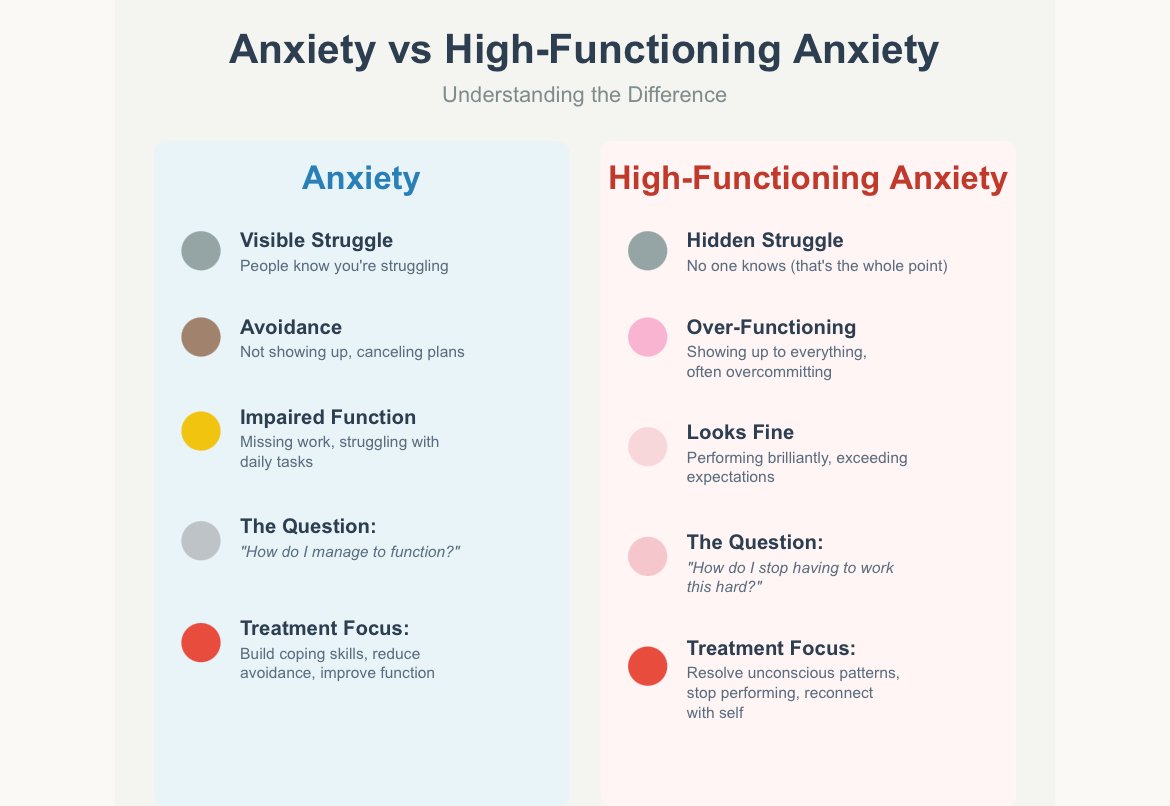Isn't High-Functioning Anxiety Just... Anxiety?
Someone asked me this last week and I had to pause.
Because honestly? It's a really fair question.
The answer is yes. High-functioning anxiety IS anxiety.
But also... no. It's not the same as what most people think of when they hear "anxiety."
Let me explain why this matters and why so many capable, intelligent people are struggling in silence because their anxiety doesn't "look" like anxiety.
The Picture We Have of Anxiety
When most people think "anxiety," they picture:
Panic attacks that stop you in your tracks
Avoiding situations, cancelling plans
Visible struggle that others can see
That's real, valid anxiety. No question.
But high-functioning anxiety? It looks completely different.
What High-Functioning Anxiety Actually Looks Like
From the outside, you look successful. Calm. Together. The person everyone describes as "so capable."
From the inside? Overthinking and racing thoughts that never stop. Constant anxiety and tension. Perfectionism. Exhausted from appearing “fine”.
Traditional anxiety often shows up as struggle with functioning.
High-functioning anxiety drives you to over-function at massive cost to yourself.
That's the key difference.
The Signs Everyone Misses
You might have high-functioning anxiety if:
You're always the "strong one" people lean on
Look capable on the outside but feel chaotic on the inside
Perfection isn't optional, it's how you prove you're okay
You look confident but replay interactions for hours afterward
Rest feels wrong, like you're being irresponsible
You're constantly preparing for disasters that haven't happened
Asking for help feels impossible
If you just thought "that's me," you're not alone.
Why Standard Anxiety Approaches Often Miss the Mark
Here's the frustrating part.
Standard anxiety assessments ask: "Are you avoiding things? Missing work? Having panic attacks?"
Your answers are all "no." So according to the screening, you're fine.
But you're not fine. You're just really good at hiding it.
And here's what most anxiety treatment offers: breathing techniques, thought challenging, stress management, mindfulness.
Those things help. But they don't resolve high-functioning anxiety.
Why? Because you don't lack coping skills, you're already stuck in constant coping mode.
Adding more things to manage just gives you more to manage. It's like telling someone who's drowning to swim more efficiently.
You don't need to swim better. You need to get out of the water.
What's Really Happening
High-functioning anxiety isn't just anxiety you're "managing well."
It's a pattern that lives in your unconscious mind.
You learned early that:
Showing vulnerability wasn't safe
Your worth was tied to how well you functioned
Struggling wasn't acceptable
You had to perform calm even when feeling terrible
So you built a performing self to survive. And it worked, you became capable, successful, high-functioning. Now you're stuck in performance mode and can't get out
And somewhere along the way, you lost connection with who you actually are.
The anxiety is a signal. The gap between who you're performing as and who you actually are is exhausting and unsustainable.
A Different Approach
This is why I work the way I do.
Traditional therapy works at the conscious level; your thoughts, behaviours, coping strategies. That's helpful for understanding.
But high-functioning anxiety lives deeper in your emotional brain. These patterns are encoded in the limbic system and implicit memories formed when you first learned that struggling or showing vulnerability wasn't safe. Your emotional brain doesn't respond to logical reasoning or conscious effort. That's why you can understand your anxiety perfectly and still feel stuck.
Is This You?
If you can relate , you may be interested in support for high functioning anxiety
You've Been The Capable One Long Enough
What if you could actually be okay, not just look okay.
Craving More Calm In Your Life?
Download The Still Mind Toolkit for Instant Calm — a free guide with five simple techniques you can use immediately to restore a sense of calm, even when life feels overwhelming.
👉 Download here:
https://www.stillmindtherapies.com/free-toolkit
If you feel ready to go a little deeper, you’re warmly invited to book a consultation call and explore how we might work together.
👉 Book a consultation:
https://www.stillmindtherapies.com/consultationform

